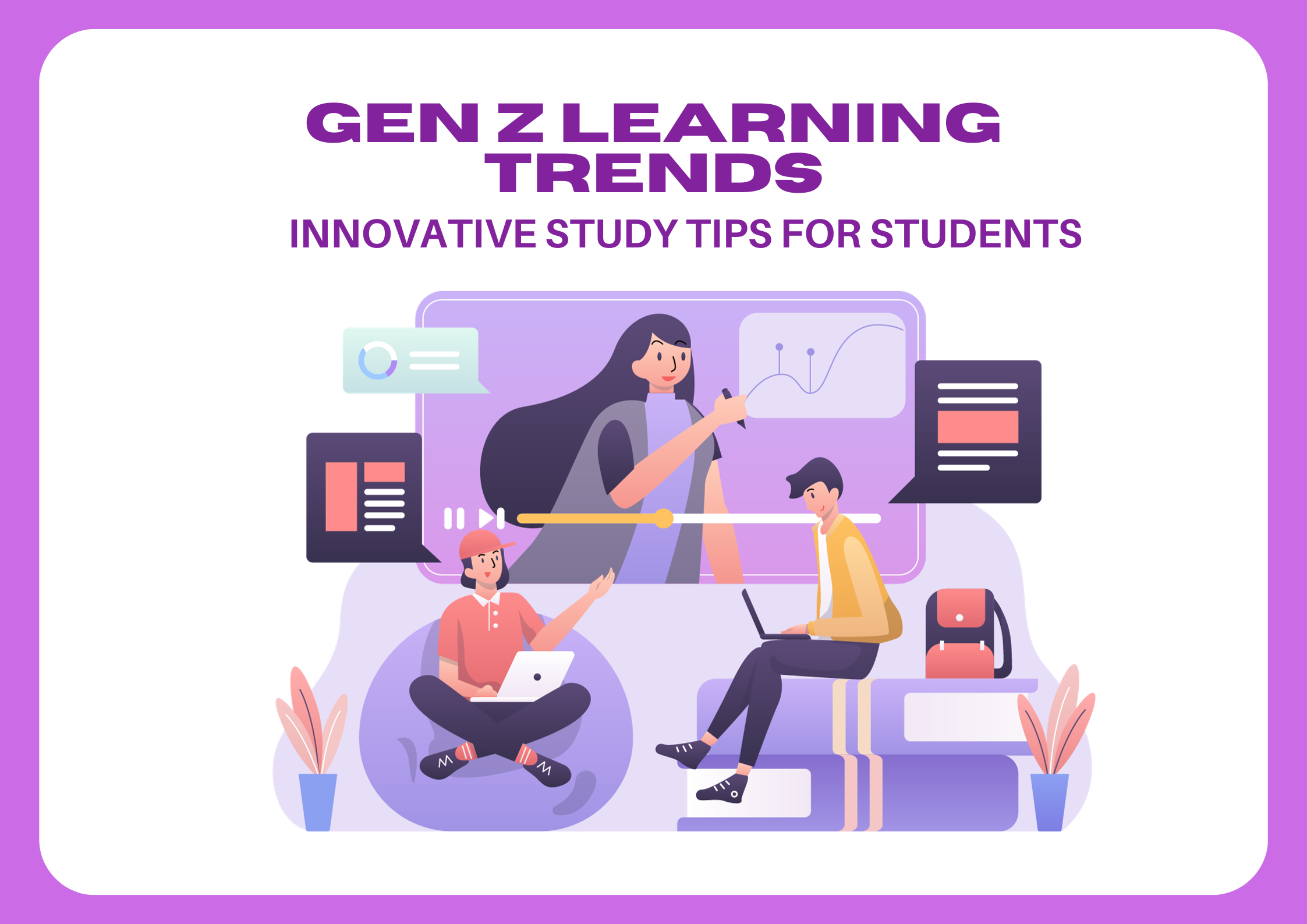In the ever-evolving landscape of education, it is crucial to understand and adapt to the unique Gen Z learning trends. Born between the mid-1990s and early 2010s, Gen Z is characterized by its digital nativity, multitasking abilities, and a preference for interactive and visual learning.
This generation’s approach to education has prompted a shift in traditional teaching methods, giving rise to innovative learning trends that leverage technology, collaboration, personalization, microlearning, and gamification.
Characteristics of Gen Z Learners
Digital Natives:
Unlike previous generations, Gen Z learning trends have grown up in a digital world. They are highly comfortable with technology, having been exposed to smartphones, tablets, and computers from a young age. This familiarity with digital tools has profound implications for their learning preferences and the way educational content is delivered.
Multitasking Abilities:
Gen Z learning trends is adept at multitasking, often managing multiple screens and activities simultaneously. This characteristic challenges educators to create engaging and dynamic learning experiences that cater to their ability to process information from various sources simultaneously.
Preference for Interactive and Visual Learning: Gen Z learners show a preference for interactive and visual learning materials. Traditional lectures and static textbooks may not fully capture their attention. As a result, educators are exploring innovative ways to integrate multimedia elements, such as videos, infographics, and interactive simulations, into the learning experience.
Gen Z Learning Trends
Technology Integration:
Leveraging Educational Apps and Platforms:
Gen Z students are embracing a variety of educational apps and platforms that offer interactive and dynamic content. These tools cater to diverse learning styles and provide instant feedback, promoting a more engaging learning experience.
Incorporating Virtual and Augmented Reality:
The use of virtual and augmented reality in education is gaining traction. These technologies offer immersive learning experiences, allowing students to explore concepts in three-dimensional spaces and enhancing their understanding of complex subjects.
Collaborative Learning:
Embracing Group Projects and Online Collaborations: Gen Z learning trendsvalues collaboration and social interaction. Educators are incorporating group projects and online collaborations to simulate real-world working environments and foster teamwork.
Utilizing Social Media for Academic Discussions:
Social media platforms are not just for socializing; they also serve as valuable tools for academic discussions. Gen Z learning trends in students are using platforms like Twitter, Instagram, and even dedicated educational forums to share ideas, ask questions, and collaborate with peers.
Personalized Learning:
Adaptive Learning Platforms:
Adaptive learning platforms use algorithms to tailor educational content to individual learning styles and progress. These platforms allow students to learn at their own pace, ensuring a personalized and effective learning experience.
Customized Study Plans:
Recognizing the diversity in learning preferences, educators are developing customized study plans that cater to individual strengths and weaknesses. This approach acknowledges that one-size-fits-all solutions may not be suitable for Gen Z learning trends.
Microlearning:
Short, Focused Study Sessions:
Gen Z learners often prefer shorter, focused study sessions over extended periods of study. Microlearning involves breaking down educational content into smaller, manageable units, making it easier for students to absorb and retain information.
Bite-sized Content for Better Retention:
The delivery of content in bite-sized formats, such as short videos, quizzes, and interactive modules, aligns with Gen Z’s preference for quick, accessible information.
Gamification:
Incorporating Game Elements into Education:
Gamification involves integrating game elements, such as competition, rewards, and interactive challenges, into the learning process. This approach not only enhances engagement but also makes learning more enjoyable.
Using Educational Games for Engagement:
Educational games designed specifically for academic purposes provide an entertaining way for Gen Z learning trends in students to reinforce concepts, test their knowledge, and develop problem-solving skills.
Innovative Study Tips for Gen Z Students

Utilizing Study Apps:
Overview of Popular Study Apps:
Gen Z students have a plethora of study apps at their disposal. From note-taking apps to flashcard tools and collaborative platforms, these apps offer a diverse range of functionalities to enhance the learning experience.
Benefits of Using Technology for Study Assistance: Incorporating technology into study routines offers benefits such as accessibility, organization, and the ability to collaborate with peers. Understanding the advantages of study apps can empower Gen Z students to optimize their study habits.
Mindful Technology Use:
Setting Boundaries for Screen Time:
While technology is a valuable learning tool, it’s essential for Gen Z students to set boundaries for screen time. Establishing a balance between online and offline activities contributes to overall well-being and prevents digital burnout.
Balancing Online and Offline Learning Activities:
In addition to academic pursuits, Gen Z students benefit from a holistic approach to learning that includes offline activities such as reading physical books, engaging in outdoor activities, and pursuing hobbies.
Active Learning Techniques:
Interactive Note-taking Methods: Traditional note-taking is evolving with the integration of interactive methods. Gen Z learning trends in students can explore visual note-taking, mind maps, and multimedia annotations to make the learning process more engaging and memorable.
Incorporating Hands-on Experiences into Studying:
Learning by doing is a powerful strategy. Incorporating hands-on experiences, such as experiments, simulations, and real-world applications, enhances understanding and retention.
Building a Digital Portfolio:
Showcasing Skills and Achievements Online:
Gen Z is navigating an increasingly digital job market. Building a digital portfolio allows students to showcase their skills, projects, and achievements in a format that resonates with prospective employers.
Creating a Dynamic Resume for the Digital Age:
A dynamic resume goes beyond traditional formats. Gen Z students can explore visually appealing resume templates, include multimedia elements, and provide links to their digital portfolio to stand out in a competitive job market.
Continuous Skill Development:
Emphasizing the Importance of Lifelong Learning:
Gen Z is entering a world where continuous skill development is essential for staying relevant. Encouraging a mindset of lifelong learning prepares students for ongoing personal and professional growth.
Exploring Online Courses and Certifications:
The Internet offers a wealth of online courses and certifications. Gen Z students can take advantage of these resources to acquire new skills, explore interests, and build a diverse skill set with Gen Z learning trends.
Challenges and Solutions
Addressing Potential Drawbacks of Technology in Education:
Digital Distractions: The integration of technology in education comes with the challenge of digital distractions. Gen Z learning trends in students may find it challenging to stay focused amid the constant influx of notifications and online stimuli.
Strategies for Maintaining Focus and Avoiding Distractions: Educators and students can collaborate to implement strategies such as designated study times, the use of productivity apps, and mindfulness techniques to mitigate digital distractions and maintain focus.
Conclusion
Understanding and adapting to the learning trends of Generation Z are essential for educators and students alike. Integrating technology, collaboration, personalization, microlearning, and gamification reflects the dynamic nature of education in the 21st century.
By embracing these trends and incorporating innovative study tips, Gen Z learning trends in students can navigate the educational landscape with confidence, preparing themselves for a future that demands adaptability, critical thinking, and continuous learning.
Balancing traditional and innovative study methods ensures a comprehensive and effective approach to education that resonates with the unique characteristics of Generation Z.










